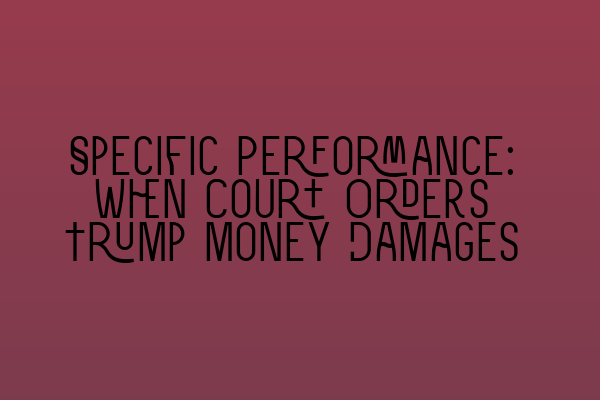Specific Performance: When Court Orders Trump Money Damages
In the world of contract law, disputes can arise between parties that can only be resolved through a court’s intervention. These disputes often center around breaches of contract, where one party fails to fulfill their obligations as outlined in the agreement. When this occurs, the injured party may seek damages to compensate for the losses suffered as a result of the breach. However, in certain circumstances, the court may go one step further and order specific performance, which trumps money damages. In this blog post, we will explore the concept of specific performance and when it may be ordered by the court.
Before delving deeper into the concept of specific performance, it’s important to understand the difference between damages and specific performance. Damages refer to the monetary compensation awarded to the injured party to offset the losses suffered. This form of relief is typically the most common and easily quantifiable solution. Specific performance, on the other hand, is when the court orders the breaching party to perform the contractual obligation exactly as specified in the contract. This remedy is often sought in cases where the subject matter of the contract is unique and cannot be easily substituted.
The availability of specific performance is subject to certain conditions and legal principles. Firstly, the injured party must show that there is no adequate remedy at law. This means that monetary compensation alone would not adequately compensate for the harm suffered. For example, in cases involving the sale of rare or one-of-a-kind items, such as artwork or antiques, money damages would not adequately restore the injured party to their original position. In such cases, specific performance may be deemed appropriate.
Secondly, the court will also consider the feasibility of enforcing specific performance. If it is practically impossible or unduly burdensome for the breaching party to perform their contractual obligations, the court may be reluctant to order specific performance. For example, if the subject matter of the contract has been destroyed or if the contract involves personal services, the court may consider specific performance unenforceable.
It’s worth noting that specific performance is a discretionary remedy, meaning that the court has the discretion to award this remedy or not. The court will consider various factors, including the nature of the subject matter, public policy concerns, and the parties’ behavior leading up to the breach, in determining whether to order specific performance. It is also important to mention that specific performance is not available for every type of contract. Certain contracts, such as contracts for personal services or contracts involving personal preferences, may not be eligible for specific performance.
Seeking specific performance requires the injured party to bring the matter before the court and provide compelling arguments as to why this remedy is appropriate. This is where the expertise of a solicitor well-versed in contract law comes into play. Solicitors who specialize in contract law will be able to navigate the complexities of specific performance and build a strong case for their clients.
At SQE Contract Law, we understand the nuances of specific performance and can provide expert advice and representation to clients seeking this remedy. Our team of solicitors has a deep understanding of contract law and extensive experience in handling complex contract disputes. We have a proven track record of successfully obtaining specific performance orders for our clients, even in the most challenging cases.
For those preparing for the SQE exams, we offer a range of preparation courses to enhance your understanding of contract law. Our SQE 1 Practice Exam Questions and SQE 1 Practice Mocks FLK1 FLK2 resources will help you test your knowledge and build the necessary skills to excel in your exams. We also provide SQE 2 Preparation Courses to ensure you are fully prepared for the challenges of the SQE exams. Don’t forget to check out the SRA SQE Exam Dates to stay updated on the upcoming exams.
In conclusion, specific performance is a unique remedy in contract law that allows a court to order a breaching party to fulfill their contractual obligations exactly as specified in the contract. This remedy is sought when monetary compensation alone cannot adequately restore the injured party to their original position. However, specific performance is not available for every type of contract and is subject to the court’s discretion. If you find yourself in a situation where specific performance may be a viable remedy, it is crucial to seek the guidance of a solicitor with expertise in contract law. At SQE Contract Law, our team is ready to assist you in navigating the complexities of specific performance and obtaining the desired outcome in your contract dispute.
Remember, in contract law, sometimes court orders trump money damages.
